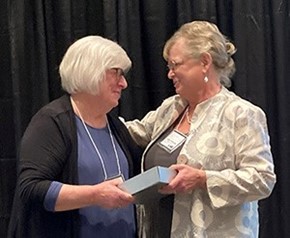Anthropology professor and former chair Dr. Jodie O’Gorman receives distinguished award and reflects on career
December 15, 2022 - Katie Nicpon

During the annual Midwest Archaeological Conference (MAC), Dr. Jodie O’Gorman, MSU Department of Anthropology professor, received the Distinguished Career Award that recognizes archaeologists who have demonstrated excellence and contributed significantly and regularly to the advancement of Midwestern archaeology.
“I”m honored to receive the Distinguished Career Award and I’m very grateful to those who took the time to nominate me and write in support of the nomination,” Dr. O’Gorman said.
The award has deep meaning for O’Gorman because the MAC has been a valuable part of her professional life since graduate school.
“I gave my first professional paper at a MAC meeting decades ago, and participating in the organization has taught me a lot over the years about professionalism and advocacy – and of course the archaeology of the midcontinent. I’ve served as a board member, secretary, and president of the organization, and helped host two of its annual meetings in East Lansing.”
Additionally, receiving the award in La Crosse, Wisconsin held special meaning for Dr. O’Gorman because her roots are nearby on the Minnesota side of the Mississippi Valley, and she spent summers in La Crosse from 1987-1990 working for the Wisconsin State Historical Society on a complex of village sites outside the city. Her dissertation research emerged from that project.
As part of the MAC conference, Drs. Lynne Goldstein (MSU Professor Emerita of Anthropology) and Jenn Bengtson (Associate Professor, Southeast Missouri State University) put together a symposium in her honor titled, “Migration, Gender, Foodways, and Collections in the Midwestern U.S.: Various Pathways in Honor of Jodie O’Gorman.” The symposium featured studies that explored a few of Jodie O’Gorman’s major research interests. A number of her colleagues and former students wanted to honor Jodie and highlight her significant impact on archaeology in the Midwestern U.S.
Dr. O’Gorman’s research interests have focused on Native American village life in the midcontinent of North America from about AD 1000 to 1700s. Archaeologists identify many different cultural traditions in the midcontinent during this period and she has been interested in the relationships of different groups within and between communities.
“Many people were living in substantial villages during this time and some of the villages and towns can be described as multi-ethnic,” she said. “I’m interested in how people negotiated their interactions and how ideas and practices both created and maintained relationships between people and between people and their landscape. Throughout my career, I’ve been particularly interested in how the role of women and their agency in foodways play into these interactions.”
Dr. O’Gorman plans to retire September 1, 2023, and is beginning to reflect on her career.
“I’m very proud of the Morton Village research project I’ve been co-directing for almost 15 years now,” she reminisced. “Our field and lab work at the site has been the focus or contributed to eight dissertations and many publications have come from the research. My students, the co-PI, collaborators, and myself have come to interpret the multi-ethnic site in new ways and colleagues are realizing how important this example is to how we understand ancient patterns of Native American cultural interactions across the broader region.”
She has also spent time reflecting on the students she has taught in field schools and other archaeology courses.
“I enjoyed my time with them very much and many individuals stand out – mostly for positive reasons! I am proud of them all whether they pursued careers in archaeology or simply moved on having learned more about archaeology. I’m especially thankful for having the opportunity to work with Native American students and colleagues at MSU; they’ve helped me understand more fully the importance of different perspectives and made me a better archaeologist.”
Upon her retirement, Dr. O’Gorman plans to explore a variety of research and other interests that fell by the wayside during the past forty years.
“But my top goal is to spend more time with my family, especially my grandchildren,” she said. “And my partner, and enjoy our cabin in the woods, tend my gardens, fish more, read more, paint more, write different things – the list goes on.”
Dr. O’Gorman joined the MSU Department of Anthropology in 2000 and served as the department chair for nine years.
“We’re so grateful to Jodie for her dedication to our students, our colleagues, our community partners and the field,” Todd Fenton, Ph.D., said, professor and current department chair. “We especially appreciate Jodie’s service as our chair for nine years. We wish her so much joy and time with loved ones during her retirement.”
To learn more about Dr. O’Gorman, visit anthropology.msu.edu.

